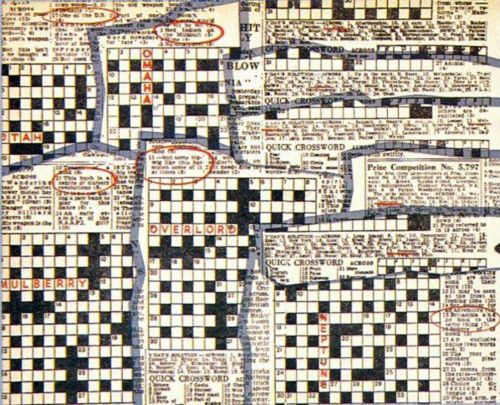An MI5 official doing his crossword in May of 1944 discovered a potential leak in plans for D-Day. Several clues were put in the puzzle over a period of time which related to the operation, including the name of Operation Overlord itself. Among the clues were also the beaches planned for invasion, Omaha and Utah. This turned investigation toward Leonard Dawe, the editor of the crossword, to see if he could have somehow learned of the D-Day plans.
Leonard Dawe was suspected of treason, but it could not be proven and he was promptly released. He had a collaborator at the crossword who was also investigated to no avail. Since Dawe had worked for a school, Old Strand, there were several students who were also confused as to what was going on. They could not be told about D-Day, but they saw Dawe taken away by MI5 officials and found the matter very strange. Still, most of them thought it was impossible that Dawe could have betrayed the Allies.
They turned out to be right. The D-Day clues in fact had absolutely nothing to do with any sort of espionage. This would be found out years later, when the Normandy invasion was forty years in the past. A student from Old Strand admitted to having submitted at least one of the clues. As it turns out, Old Strand was not far from where several Allied troops were stationed, and occasionally the students were able to speak with the men. When the students were asked to submit crossword clues, many of them used words they had heard from the soldiers, The Telegraph reports.
The soldiers were excited with the chance to mix with local civilians, especially the soldiers who had children they were forced to leave behind at home. For those soldiers, there were no secrets guarded as closely as they were at MI5. The D-Day code words were shared with many students who submitted them as crossword clues, knowing the names of the beaches but not where they were.
The D-Day crossword may have been a misunderstanding, but it shows how important national security is. MI5 was willing to investigate even the most unlikely suspect to see how the clues had gotten into such a public spot. Student Ronald French, one of the submitters, felt guilty over what nearly happened to Dawe, but luckily the issue was resolved. The fact that MI5 would find D-Day code words hidden in a crossword to begin with appears as a sure sign that they do everything they can to prevent a breach in the security of national intelligence.
